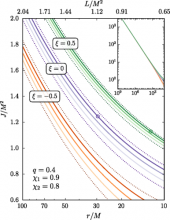
Abstract
The dynamics of precessing binary black holes (BBHs) in the post-Newtonian regime has a strong timescale hierarchy: the orbital timescale is very short compared to the spin-precession timescale which, in turn, is much shorter than the radiation-reaction timescale on which the orbit is shrinking due to gravitational-wave emission. We exploit this timescale hierarchy to develop a multi-scale analysis of BBH dynamics elaborating on the analysis of Kesden et al. (2015). We solve the spin-precession equations analytically on the precession time and then implement a quasi-adiabatic approach to evolve these solutions on the longer radiation-reaction time. This procedure leads to an innovative "precession-averaged" post-Newtonian approach to studying precessing BBHs. We use our new solutions to classify BBH spin precession into three distinct morphologies, then investigate phase transitions between these morphologies as BBHs inspiral. These precession-averaged post-Newtonian inspirals can be efficiently calculated from arbitrarily large separations, bridging the gap between astrophysics and numerical relativity.